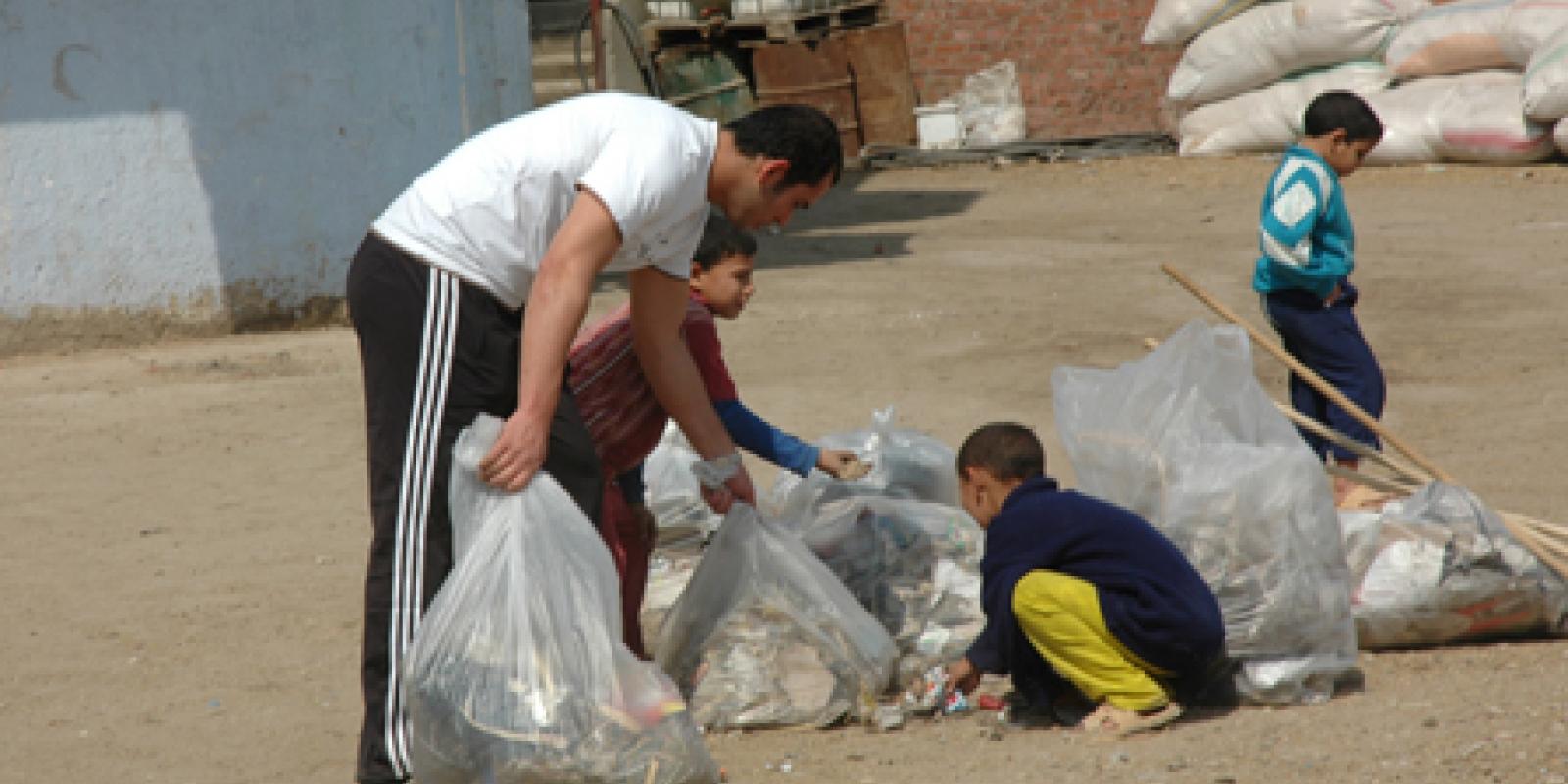
AUC Helps Establish Community-Based Learning Model at Palestinian University
With the success of the community-based learning (CBL) program at AUC, which is in its 10th year now, the University will partner with An-Najah National University in Palestine to help produce a similar program there. AUC will collaborate with An-Najah university to establish 10 CBL courses and facilitate training programs during the two-year process.
“We are the ‘trainers’ and are engaged in every step of project,” explained Pandeli Glavanis, director of AUC’s CBL program and associate director of the Center for Learning and Teaching, which will coordinate with the Office of Undergraduate Studies on this project. “We will constantly have a link with them, and I am sure we will continue to help each other and learn from one other.”
Three professors from An-Najah National University in Palestine met with AUC faculty members and students last week to learn about the CBL program in an effort to create a similar program at their home university.
As part of an initiative to blend service activities with academic courses, the University incorporated community-based learning as part of its curriculum in 2003. The program has been implemented in more than 50 courses spanning different disciplines, from English and history to biology and political science. The courses involve students working with nongovernmental organizations (NGOs) or providing services to different segments of society, including orphans, cancer patients, refugees and marginalized groups. In the process, the students learn about challenges facing their community and the importance of taking an active stance.
“I chose to take a CBL class because it links theory to real-world experience,” affirmed Kareem Radwan, a business administration major at AUC, who discussed his CBL experience with the three professors. “The fact is that AUCians live in a bubble, and through a CBL course, I was able to explore the different suburbs in Cairo and see problems with my own eyes instead of reading about them in a book. This has made me more passionate about solving the problems we face in Egypt.”
For Radwan, CBL has heavily influenced his future goals. “CBL has changed my perspective of life completely,” he said. “Because of CBL classes, I have decided to work for Watanaya, which is a nongovernmental organization that deals with orphanages all around Egypt.”
The An-Najah university professors –– Abdel Kareem Daragmeh, director of the Center for Excellence in Learning and Teaching; Jawad Fatayer, clinical sociologist at the School of Medicine and Health Sciences; and Abdel Razzak Natsheh, assistant professor at the Department of Computerized Information Systems –– were excited about the innovativeness of AUC’s CBL program and its influence on students and society. “I was impressed by the impact CBL had on students and the community,” Fatayer said. “These classes clearly led to student growth and personal development by changing their sense of reality in Egypt.”
Daragmeh added, “We are trying to initiate a community-based learning program in Palestine that will be designed across several disciplines, like information technology, medicine, education, language and engineering. Because AUC has a history of providing a rich environment for learning and teaching, we wanted to be introduced to what its CBL program offers in terms of designing and implementing quality education and balancing the academic with the practical.”
After listening to students and faculty members discuss the benefits of CBL courses, the professors affirmed the importance that CBL would play in a country like Palestine. “When we look at Palestine,” Fatayer noted, “we see a series of difficult circumstances that have occurred because of the occupation, so we need to empower the university to become connected to the needs and expectations of the community.”
Glavanis also acknowledged the role CBL would play in Palestine. “Given the nature of the occupation, maintaining a close link between academic institutions and the community is absolutely integral,” said Glavanis. “Palestinian universities have always been involved in the community through extracurricular activities, but this was never done in a systematic way. Hopefully, the new CBL program will upgrade what they do and how they do it.”
The three professors from An-Najah University already have CBL projects that they would like to implement. Daragmeh hopes to have his students design educational curricula for children in grades 1 through 4. Fatayer would like to have his students lead medical awareness sessions in several communities to help residents become more aware of best medical practices. Natsheh hopes to send his students to new Palestinian information technology companies in order to work on coding in a hands-on environment. After visiting AUC and learning about its CBL course content from faculty members like Mona Amer, Lamyaa El-Gabry and Mark Mikhael, Daragmeh believes that these CBL projects will definitely be “doable and feasible” at An-Najah National University.
For more information on the CBL program at AUC,click here.
Photo caption: The CBL program at AUC fosters a rich learning environment beyond classroom walls
